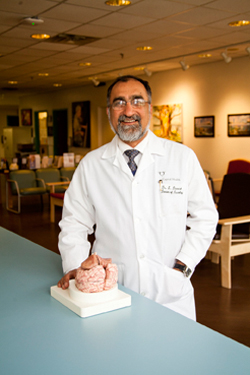Research
For nearly 20 years, Dr. Sultan Darvesh has been unravelling the mysteries of an enzyme in the brain called butyrylcholinesterase (BCHE). Through years of careful study, Dr. Darvesh deduced that BCHE could be used as a diagnostic marker for Alzheimer’s disease. Now, he is translating his discoveries about this enzyme into a revolutionary new technology with the power to diagnose this devastating disease in its earliest stages, before the damage has been done.
As a co-founder and director of the Maritime Brain Tissue Bank, Dr. Darvesh has had ample opportunity to examine the stored brains of people who had Alzheimer’s disease, dementia and other diseases affecting the brain. What he noticed is that BCHE accumulates specifically among the plaques and tangles of brains affected by Alzheimer’s disease. It does not behave this way in other neurodegenerative diseases.
“The light went on, and I knew I had identified a potential marker for diagnosing Alzheimer in the living brain,” Dr. Darvesh says. “The challenge would be to find an effective, non-invasive way to detect the enzyme.”
Over the past few years, he and his collaborators have synthesized and screened hundreds of compounds, seeking an agent that would bind with BCHE to illuminate the enzyme in nuclear-imaging studies.
Last year, they found what they were looking for—a compound that’s able to cross the blood-brain barrier, locate and bind to the BCHE, and light up in imaging scans.
“It has just the qualities you need in a diagnostic agent,” Dr. Darvesh says. “It’s potent, targeted and specific.”
Now, with help from a knowledge translation grant from the Brain Repair Centre, Dr. Darvesh and his collaborators in the Biomedical Translational Imaging Centre (BIOTIC) are optimizing the compound to provide high-contrast, high-resolution images using PET and SPECT scans. They aim to have the compound ready for clinical testing in 2016.
Not only does this new compound open the door to early diagnosis— and therefore the possibility of effective treatment to stop Alzheimer’s disease in its early stages—it also has the potential to aid the develop¬ment of such disease-modifying drugs.
“Researchers need a way to see if their treatments are working in real peoples’ brains,” explains Dr. Darvesh. “Our compound provides this opportunity.”
In fact, Dr. Darvesh works closely with fellow neurologist and chemist Dr. Don Weaver, who recently left Halifax to intensify his efforts to develop effective anti-Alzheimer drugs.
“I’m heading up the diagnostics arm in Halifax, and Don is heading the therapeutic arm in Toronto,” notes Dr. Darvesh of their work with Treventis Corp. “It’s an exciting, very promising venture.”

Dr. Sultan Darvesh, Capital Health neurologist, chemist and researcher.